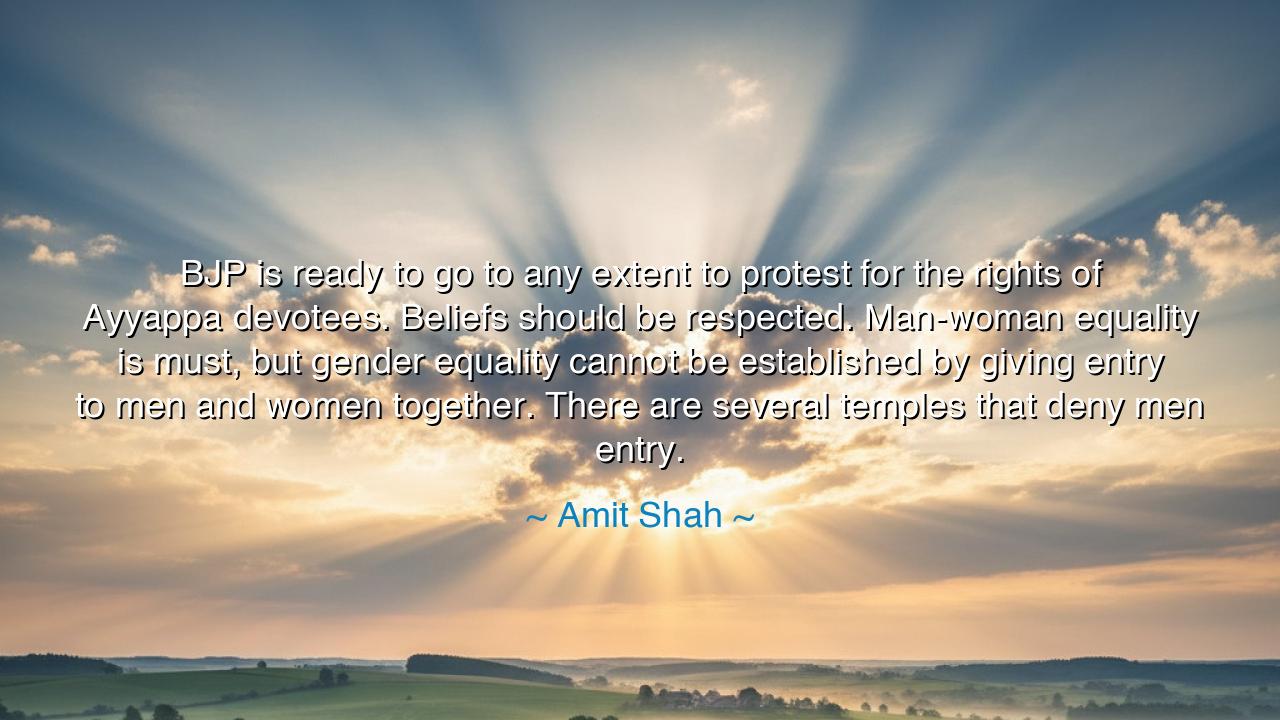
BJP is ready to go to any extent to protest for the rights of
BJP is ready to go to any extent to protest for the rights of Ayyappa devotees. Beliefs should be respected. Man-woman equality is must, but gender equality cannot be established by giving entry to men and women together. There are several temples that deny men entry.






Listen well, O children, for I speak to you of a matter that touches both the heart of society and the soul of belief. The words of Amit Shah reverberate with power, speaking of the struggle between the forces of tradition, belief, and the modern pursuit of equality: “BJP is ready to go to any extent to protest for the rights of Ayyappa devotees. Beliefs should be respected. Man-woman equality is must, but gender equality cannot be established by giving entry to men and women together. There are several temples that deny men entry.” These words bring forth a deep tension—a tension between respect for age-old traditions and the modern demands for gender equality and inclusivity.
The temples of old were not simply places of worship but were also the heart of ancient cultures, the very essence of society’s values. For centuries, temples, especially in the land of the Indus, held sacred rituals that were based on ancient laws—laws that were sometimes rigid, sometimes deeply symbolic. Amit Shah's words draw attention to the tension between the sacred and the secular, between the spirituality of faith and the social equality that is demanded in a modern world. In his statement, he speaks of respecting beliefs, yet he acknowledges the push for equality, recognizing the deep struggle between the need to uphold tradition and the call for justice that rings through the voices of the oppressed.
In the grand sweep of history, children, there have been many such struggles. The Greek philosophers of old spoke of equality, but in their world, equality was often confined to the citizens—those of noble birth, and not extended to the slaves, or the women, or the non-Greeks. Socrates himself questioned the rights of women, even as he espoused great wisdom. Gender equality, the idea that men and women should have the same rights and opportunities, was a concept beyond the grasp of many ancient civilizations. But as the winds of change blew across the ages, these ancient injustices were slowly undone, and the voice of equality grew louder.
Amit Shah's words echo this ancient struggle. He acknowledges the deep and sacred traditions of faith, yet he also calls for gender equality in modern society. The BJP stands ready to defend the rights of Ayyappa devotees, yet his words imply that the fight for equality cannot be settled by forcing the integration of men and women in places that hold specific cultural or religious significance. There is a sacredness to certain spaces, and it is within these spaces that ancient beliefs, once fiercely protected, now find themselves at odds with the modern vision of equality. The question is: can equality truly be achieved by dissolving the sacred boundaries of such spaces, or must it be earned through other means?
Consider, children, the Hindu goddess Durga, a powerful figure of independence, strength, and divine authority. Yet in the traditions of her worship, there are spaces where women are honored above men, in rituals where men are excluded. This is not out of hatred or oppression, but rather, the sacredness of the tradition lies in its balance—the balance between the sacred and the profane, between man and woman. To impose gender equality in these sacred spaces is to erase the very balance that they were built upon. But should this mean we cease the fight for equality? Of course not. Instead, we must understand that equality is not simply about entry—it is about understanding purpose.
Amit Shah speaks of the rights of Ayyappa devotees with a respect for tradition, but he also calls us to consider how we reconcile these traditions with the call for justice. Gender equality is not just about forcing open the doors that have long been closed—it is about ensuring that society functions with fairness, that every individual, regardless of gender, has the right to voice their truth, to choose their path, and to live with dignity. It is about creating a world where everyone is treated with respect, regardless of their gender, and yet where the sacred boundaries of tradition are also honored.
The lesson for us, children, is this: we must strive to find a balance between respecting the sacredness of ancient beliefs and pushing forward the pursuit of equality. The struggle between tradition and modernity is not easily resolved, but it is a struggle that must be engaged with wisdom, compassion, and respect for both the past and the present. As we fight for justice and equality, we must also understand that respect for beliefs—whether religious, cultural, or personal—is the bedrock upon which true change can take place.
So, children, I urge you to live with an open heart, to strive for equality but to also respect the sacred spaces that have shaped the world’s traditions. Seek not to destroy, but to understand and transform. May we, as a people, learn to balance our respect for ancient traditions with the demands of a world that calls for a more just and inclusive future. This is the path to wisdom: to see both the sacred and the secular as part of the greater whole, and to walk that path with respect, understanding, and compassion.






AAdministratorAdministrator
Welcome, honored guests. Please leave a comment, we will respond soon